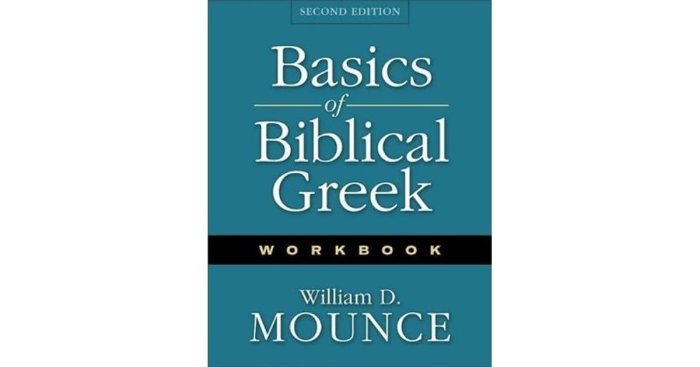Unveiling the Basics of Biblical Greek Workbook Answers, this comprehensive guide embarks on an enlightening journey into the intricacies of biblical Greek, empowering readers to delve deeper into the original texts and unlock the profound meanings concealed within.
Through a meticulous exploration of vocabulary, grammar, sentence structure, and exegetical tools, this workbook provides an indispensable foundation for deciphering the complexities of biblical Greek, fostering a deeper understanding of the sacred texts.
Vocabulary Basics

Vocabulary is the foundation of any language, and biblical Greek is no exception. A solid understanding of Greek vocabulary is essential for understanding the New Testament in its original language.
The Greek alphabet consists of 24 letters, each with a corresponding pronunciation. Once you have mastered the alphabet, you can begin to learn the basic vocabulary of biblical Greek.
Here is a list of some of the most common Greek vocabulary words and their meanings:
- θεός (theos) – God
- Ἰησοῦς (Iēsous) – Jesus
- Χριστός (Christos) – Christ
- πνεῦμα (pneuma) – Spirit
- ἀγάπη (agapē) – love
- πίστις (pistis) – faith
- ἐλπίς (elpis) – hope
- σωτηρία (sōtēria) – salvation
- βασιλεία (basileia) – kingdom
- δύναμις (dynamis) – power
These are just a few of the many Greek vocabulary words that you will encounter in the New Testament. By learning these words, you will be well on your way to understanding the Bible in its original language.
Grammar Essentials, Basics of biblical greek workbook answers
Grammar is the system of rules that govern how words are combined to form sentences. In biblical Greek, there are eight parts of speech: nouns, pronouns, adjectives, verbs, adverbs, prepositions, conjunctions, and interjections.
Verbs are the most important part of speech in biblical Greek. They indicate the action or state of being of the subject. Greek verbs are conjugated to indicate tense, mood, voice, and person.
Here are some examples of Greek grammar in action:
Ὁ θεός ἐστιν ἀγάπη.
(God is love.)
Ἐγὼ εἰμι ἡ ἄμπελος.
(I am the vine.)
Ἐὰν μὴ πιστεύσητε ὅτι ἐγώ εἰμι, ἀποθανεῖσθε ἐν ταῖς ἁμαρτίαις ὑμῶν.
(If you do not believe that I am he, you will die in your sins.)
These are just a few examples of the many ways that Greek grammar is used in the New Testament. By understanding Greek grammar, you will be able to read and understand the Bible in its original language.
FAQ Explained: Basics Of Biblical Greek Workbook Answers
What are the benefits of studying biblical Greek?
Studying biblical Greek enhances one’s understanding of the original biblical texts, providing a deeper appreciation for the nuances and subtleties of the language.
How does this workbook aid in biblical interpretation?
This workbook provides a comprehensive framework for understanding Greek grammar and vocabulary, equipping readers with the tools necessary to interpret biblical passages accurately.